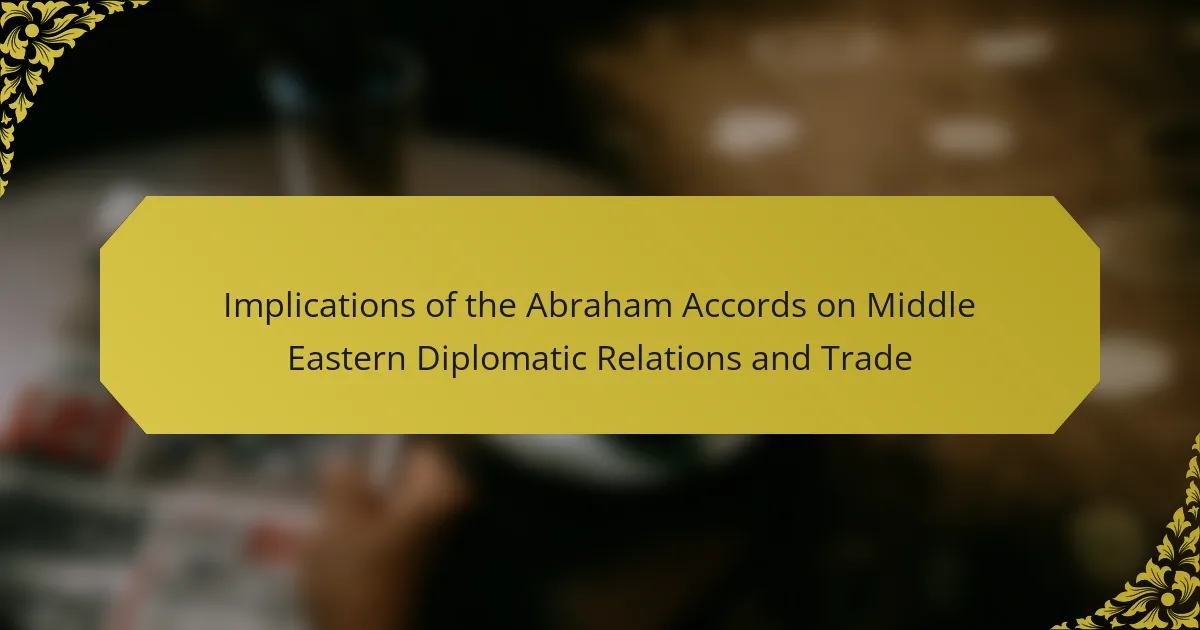
What are the Abraham Accords and their significance in Middle Eastern diplomacy?
The Abraham Accords are agreements normalizing relations between Israel and several Arab nations, notably the UAE and Bahrain. Signed in 2020, these accords signify a shift in Middle Eastern diplomacy. They promote cooperation on economic, security, and cultural fronts. The agreements aim to foster peace and stability in a historically volatile region. The Accords also encourage other Arab nations to consider normalization with Israel. This has potential implications for Palestinian relations, as it alters traditional Arab support dynamics. The Abraham Accords mark a significant milestone in diplomatic relations, highlighting a willingness to prioritize economic benefits over longstanding conflicts.
How did the Abraham Accords change diplomatic relations in the Middle East?
The Abraham Accords significantly altered diplomatic relations in the Middle East. They established formal ties between Israel and several Arab nations, including the United Arab Emirates and Bahrain. This marked a shift from decades of non-recognition and hostility. The agreements fostered economic cooperation, security collaboration, and cultural exchanges. They also encouraged other nations to consider normalization with Israel. As a result, the accords have reshaped regional alliances and reduced tensions. Historical animosities have been challenged, leading to a more interconnected Middle East. The accords reflect a pragmatic approach to diplomacy, focusing on mutual benefits.
What countries are involved in the Abraham Accords?
The countries involved in the Abraham Accords are Israel, the United Arab Emirates (UAE), Bahrain, Sudan, and Morocco. These nations normalized relations with Israel through agreements signed in 2020 and 2021. The accords aim to promote peace, economic cooperation, and diplomatic relations in the Middle East. The UAE and Bahrain were the first to sign the accords, followed by Sudan and Morocco. This initiative marks a significant shift in Middle Eastern diplomacy. The agreements focus on various sectors, including trade, tourism, and technology.
What are the key agreements and principles established by the Accords?
The key agreements and principles established by the Accords include normalization of relations between Israel and several Arab nations. This normalization includes diplomatic recognition, trade relations, and cooperation in various sectors. The Accords emphasize mutual respect and peaceful coexistence. They also promote economic collaboration and security partnerships. The agreements aim to enhance stability in the Middle East. Additionally, they encourage dialogue and conflict resolution. The Accords represent a shift in regional dynamics, facilitating broader Arab-Israeli relations. The principles established aim to foster a more integrated and cooperative Middle East.
Why are the Abraham Accords considered a turning point in regional relations?
The Abraham Accords are considered a turning point in regional relations because they established formal diplomatic ties between Israel and several Arab nations. These agreements, signed in 2020, marked a shift from decades of hostility to cooperation. The United Arab Emirates and Bahrain were the first to normalize relations with Israel. Subsequently, Sudan and Morocco also joined the accords. This change has facilitated economic partnerships and security collaborations. The accords have also encouraged other Arab states to reconsider their stance towards Israel. This shift in diplomatic relations promotes stability in the region. The agreements are viewed as a significant step towards peace and mutual recognition in the Middle East.
What historical context led to the formation of the Abraham Accords?
The historical context leading to the formation of the Abraham Accords includes longstanding tensions in the Middle East. Key events such as the Arab-Israeli conflict, which began in the mid-20th century, shaped regional dynamics. The 1979 Egypt-Israel Peace Treaty marked the first Arab recognition of Israel. This set a precedent for future agreements. Additionally, Iran’s growing influence and nuclear ambitions increased regional security concerns. The United States played a pivotal role in facilitating dialogue between Israel and Arab states. In 2020, the Accords were signed by Israel, the UAE, and Bahrain, reflecting changing priorities in the region. Economic interests and countering Iran’s influence were significant motivators for these nations.
How do the Accords impact traditional alliances in the region?
The Accords alter traditional alliances in the Middle East by fostering new partnerships. They encourage normalization between Israel and several Arab states. This shift undermines long-standing alliances, particularly those centered around opposition to Israel. Countries like the UAE and Bahrain have prioritized economic and security cooperation with Israel. This has led to a realignment of regional power dynamics. Traditional allies may feel pressured to reassess their positions. The Accords also challenge the Palestinian leadership’s influence. As new alliances form, the historical context of regional diplomacy is evolving.

What implications do the Abraham Accords have on trade in the Middle East?
The Abraham Accords significantly enhance trade in the Middle East. They foster normalization between Israel and several Arab nations. This normalization leads to increased economic cooperation and investment opportunities. Trade agreements and partnerships are more likely to emerge as a result. For instance, Israel has established trade relations with the UAE and Bahrain. The accords also promote regional supply chains and market access. Increased trade can stimulate economic growth in participating countries. Overall, the Abraham Accords create a more interconnected Middle Eastern economy.
How do the Accords facilitate economic cooperation among signatory nations?
The Accords facilitate economic cooperation among signatory nations by establishing formal diplomatic relations. These relations promote trade agreements and investment opportunities. For instance, the Accords have led to the normalization of trade between Israel and the UAE. This normalization has resulted in increased bilateral trade, reaching over $700 million in the first year. Additionally, the Accords encourage joint ventures in various sectors, including technology and tourism. Economic forums and trade delegations have been initiated to strengthen these ties. Such initiatives enhance collaboration and create a more integrated regional economy.
What trade agreements have emerged as a result of the Accords?
The Abraham Accords have led to several trade agreements between Israel and its new partners, including the United Arab Emirates and Bahrain. These agreements focus on various sectors, such as technology, agriculture, and tourism. For instance, the UAE and Israel signed a comprehensive economic agreement in 2020. This agreement aims to enhance trade and investment, leading to increased bilateral trade. Additionally, Israel and Bahrain established a free trade agreement in 2021. These agreements are expected to boost economic cooperation and foster regional stability.
How do these trade agreements benefit the economies of the involved countries?
Trade agreements benefit the economies of the involved countries by enhancing market access and promoting economic cooperation. These agreements lower tariffs and reduce trade barriers, which encourages exports. Increased exports lead to higher production levels and job creation. For example, the Abraham Accords have opened new trade routes between Israel and its Arab neighbors. This has resulted in increased trade volume, fostering economic growth in both regions. Furthermore, collaboration in sectors like technology and agriculture enhances innovation. The World Bank reported that such agreements can increase GDP by up to 1.5% in participating countries.
What challenges do the Abraham Accords face in terms of trade relations?
The Abraham Accords face several challenges in trade relations. Political instability in the region creates uncertainty for trade agreements. Economic disparities between the signatory countries can hinder collaboration. Additionally, existing trade barriers and tariffs complicate the implementation of free trade initiatives. There are also concerns about mutual recognition of standards and regulations. Resistance from certain groups within the countries may impact trade negotiations. Furthermore, regional conflicts can disrupt supply chains and affect trade flows. These factors collectively pose significant obstacles to enhancing trade relations under the Abraham Accords.
What are the political and economic barriers to trade expansion?
Political and economic barriers to trade expansion include tariffs, trade restrictions, and geopolitical tensions. Tariffs increase the cost of imported goods, discouraging trade. Trade restrictions can take the form of quotas or bans, limiting the volume of goods exchanged. Geopolitical tensions, such as conflicts or sanctions, create an unstable environment for trade. Additionally, political instability in certain regions can deter investment and trade partnerships. Economic factors like currency fluctuations and inflation can also hinder trade by affecting pricing and purchasing power. Overall, these barriers can significantly impact the flow of goods and services between nations.
How might regional tensions affect trade agreements established by the Accords?
Regional tensions can undermine trade agreements established by the Accords. Heightened conflicts may lead to distrust among signatory nations. This distrust can result in reduced cooperation on economic initiatives. For instance, countries may impose tariffs or trade barriers in response to political disputes. Additionally, regional instability can deter foreign investment, impacting economic growth. Historical examples show that trade relations often suffer during times of conflict. The ongoing tensions in the Middle East illustrate this dynamic, affecting the implementation of the Accords. Without stability, trade agreements may not reach their full potential.

What future trends can be expected from the Abraham Accords in diplomatic relations and trade?
Future trends from the Abraham Accords in diplomatic relations and trade include increased normalization between Israel and Arab nations. This normalization is likely to foster greater cooperation in various sectors, such as technology, tourism, and agriculture. Trade agreements are expected to expand, enhancing economic ties and regional stability. Additionally, the Accords may lead to further diplomatic initiatives, with more countries considering similar agreements. Economic partnerships could emerge, focusing on mutual benefits and shared interests. Moreover, security collaboration is anticipated to strengthen, addressing common threats in the region. The involvement of international stakeholders may also grow, facilitating investment and development projects. Overall, these trends suggest a shift towards a more integrated and cooperative Middle East.
How might the Accords evolve in response to changing geopolitical dynamics?
The Accords may evolve through expanded partnerships and new agreements. Changing geopolitical dynamics can prompt nations to seek closer ties for security and economic benefits. Increased tensions in the region could lead to more collaborative defense initiatives among signatories. Additionally, shifts in global power may encourage non-signatory states to join the Accords for strategic advantages. Historical precedents show that alliances often adapt to external pressures. For instance, the normalization of relations between Israel and several Arab nations demonstrates a response to mutual interests. As regional threats change, the Accords could see further adaptations to address emerging challenges.
What potential new partnerships could emerge from the Accords?
Potential new partnerships from the Accords include collaborations between Israel and Arab states. These partnerships may focus on technology, agriculture, and tourism. For instance, Israel could share its agricultural innovations with Gulf nations. Economic cooperation is likely to increase, enhancing trade relationships. Additionally, security partnerships may arise to address regional threats. Joint ventures in energy projects could also develop, particularly in renewable resources. The Accords facilitate dialogue, paving the way for diplomatic ties that were previously strained. These emerging partnerships can significantly reshape Middle Eastern alliances and economic landscapes.
How could technological advancements influence trade under the Accords?
Technological advancements could significantly enhance trade under the Accords by streamlining logistics and improving communication. Enhanced supply chain management through technology can reduce costs and increase efficiency. Digital platforms can facilitate easier trade agreements and transactions among nations. Innovations in transportation, such as drones and autonomous vehicles, can expedite delivery times. Data analytics can help businesses identify new market opportunities and consumer trends. Blockchain technology can enhance transparency and security in trade transactions. These advancements can lead to increased trade volume and economic collaboration among countries involved in the Accords. The integration of technology in trade practices is evident in the growth of e-commerce, which has expanded cross-border trade significantly.
What practical steps can countries take to maximize the benefits of the Abraham Accords?
Countries can maximize the benefits of the Abraham Accords by enhancing diplomatic engagement and fostering economic cooperation. Establishing regular dialogue platforms can strengthen relationships among signatory nations. Joint economic projects can create shared interests and boost trade. Countries should promote tourism initiatives to increase cultural exchange and understanding. Implementing technology partnerships can drive innovation and economic growth. Educational exchanges can build long-term relationships and mutual understanding among younger generations. Investing in infrastructure projects can facilitate trade and improve connectivity. By focusing on these practical steps, countries can effectively leverage the opportunities created by the Abraham Accords.
What best practices should businesses adopt to engage in trade under the Accords?
Businesses should adopt transparency, compliance with local regulations, and cultural sensitivity to engage in trade under the Accords. Transparency fosters trust among partners and stakeholders. Compliance with local laws ensures smooth operations and avoids legal issues. Cultural sensitivity enhances relationships and facilitates negotiations. Companies should also leverage technology for efficient communication and logistics management. Engaging in joint ventures with local firms can provide valuable insights and market access. Lastly, continuous monitoring of geopolitical developments is essential for strategic planning. These practices align with the goals of the Accords to promote economic collaboration and stability in the region.
How can governments support the implementation of trade agreements stemming from the Accords?
Governments can support the implementation of trade agreements stemming from the Accords by establishing clear regulatory frameworks. These frameworks can facilitate trade by reducing tariffs and non-tariff barriers. Additionally, governments should promote public-private partnerships to enhance trade infrastructure. Investment in logistics and transportation can streamline the movement of goods.
Training programs can be developed to educate businesses about new trade opportunities. Governments can also engage in diplomatic efforts to resolve disputes that may arise from trade agreements. Furthermore, they can provide financial incentives to encourage businesses to participate in cross-border trade.
In 2020, the UAE and Israel signed agreements to enhance economic cooperation, demonstrating the potential for successful trade collaboration.
The main entity of this article is the Abraham Accords, which are agreements normalizing relations between Israel and several Arab nations, notably the UAE and Bahrain. The article examines the significance of these accords in reshaping Middle Eastern diplomacy and trade, highlighting their impact on regional alliances, economic cooperation, and the potential for future partnerships. Key topics include the historical context leading to the accords, the benefits and challenges of trade relations among signatory nations, and practical steps for maximizing the economic advantages stemming from these agreements. Overall, the article provides a comprehensive overview of the implications of the Abraham Accords on diplomatic relations and trade in the Middle East.


